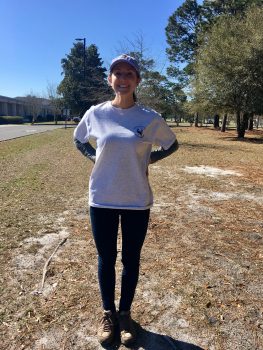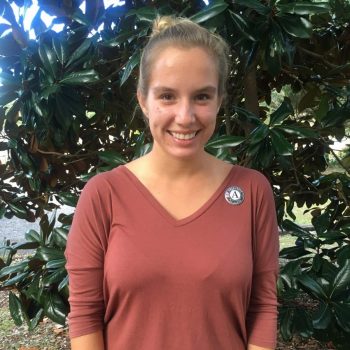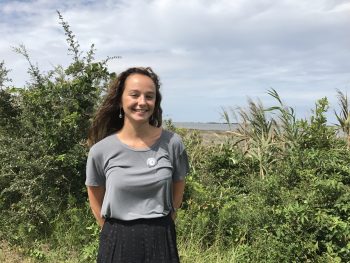 Kate Conery, Wrightsville Beach office
Kate Conery, Wrightsville Beach office
What was your favorite part about working for the North Carolina Coastal Federation? Of being an AmeriCorps member?
All of my favorite experiences with the federation were times spent working on the coast. Whether it was an education program, Coastal Ambassador training, volunteer event or organism collection, it was always a great day to work on the water! My favorite part of AmeriCorps was the opportunity to spend time on professional development. I’m almost all the way through my North Carolina Environmental Educator certification, American Red Cross CPR & First Aid certified and a NOLS certified Wilderness First Responder.
What would you say to someone who is interested in conservation work through AmeriCorps?
I’d encourage anyone interested in conservation work to apply for an AmeriCorps position! The federation was such an amazing host site so I had a really great experience, and it wouldn’t have been possible without this AmeriCorps position. My CTNC AmeriCorps program provided lots of networking opportunities and trainings, and my cohort had a ton of really cool people which made these experiences even better.
What’s been the most interesting thing you’ve learned during your time at the federation?
I’ve learned so many amazing things over the last 15 months so it’s hard to pick just one BUT one of the big things that sticks out in my head is the diversity of organisms that are found in the waterways right around the corner from our office in Wrightsville Beach.
A lot of your work has been focused on education. What makes education such an important part of environmental work?
Education is SO important in the environmental field for so many reasons. Not only will your students learn about an issue impacting their community but they’ll see the many ways we can enact positive change to hopefully inspire stewardship. Education is the key to behavior change!
What is something you think everyone should know about the North Carolina coast?
As a New York native, living and working on the North Carolina coast has been a dream. I think everyone should know just how much time, energy and money goes into protecting these amazing places.
What’s next for you, and how has your time at the federation helped you prepare for it?
This summer I’m super excited to be leading outdoor nature camps at the Piedmont Wildlife Center in Durham. I can’t wait to inspire some little ones to enjoy and connect with nature! My time at the federation has prepared me for so much more than my next job. I’ve learned so much from Ted, the last AmeriCorps member Nina (Quaratella), and everyone else at the federation. I think my biggest takeaway is how much I’ve grown as an environmental educator.
 Kristin Gibson, Ocean office
Kristin Gibson, Ocean office
What was your favorite part about working for the North Carolina Coastal Federation? Of being an AmeriCorps member?
Coastal Federation: Having the opportunity to help protect the environment while also reaching out to underserved communities.
AmeriCorps member: The opportunity to obtain my North Carolina Environmental Education Certification. I started back in September, and was given plenty of opportunities to complete the certification during my term. I finished in June!
What would you say to someone who is interested in conservation work through AmeriCorps?
It has been a rewarding experience and has helped me solidify my career goals.
What’s been the most interesting thing you’ve learned during your time at the federation?
Venus flytraps are native in a 100-mile radius of Wilmington. They require nitrogen-poor, sandy, moist soil conditions. They eat the bugs for the nitrogen!
A lot of your work has been focused on education. What makes education such an important part of environmental work?
Individuals need to be aware about environmental issues, and how they impact them and their livelihoods or community. Helping people understand that we are connected to the environment and that we need to work together to protect it is incredibly important for the future. When more people understand the environment, more people will be inclined to care for it.
What is something you think everyone should know about the North Carolina coast?
It is a uniquely beautiful place with many dedicated people working to keep it that way.
What’s next for you, and how has your time at the federation helped you prepare for it?
In September, I am moving to Salzburg, Austria to begin a US Teaching Assistantship with the Austrian Ministry of Education, Science and Research through Fulbright. After working there for 10 months, I plan on attending graduate school in August 2019.
 Reilly Kelly, Wanchese office
Reilly Kelly, Wanchese office
What was your favorite part about working for the North Carolina Coastal Federation? Of being an AmeriCorps member?
My favorite part about this experience as a whole was being able to connect with so many people from different backgrounds — whether it be local students, visiting families or just different members of the community. It was amazing to be able to serve with an organization that made it easy to promote the mission because it was something you believed in.
What would you say to someone who is interested in conservation work through AmeriCorps?
That it is a rewarding experience — not only the service, but also all of the professional development opportunities that arise throughout the term.
What’s been the most interesting thing you’ve learned during your time at the federation?
That one adult oyster can filter up to 50 gallons of water in one day!
A lot of your work has been focused on education. What makes education such an important part of environmental work?
Being able to help increase environmental literacy on the coast is an incredibly important part of environmental work. People need to first become aware and understand what they are able to do before they can go out and become stewards.
What is something you think everyone should know about the North Carolina coast?
It is beautiful!! Not just the people, but all of the different ecosystems, communities and species that call the coast home.
What’s next for you, and how has your time at the federation helped you prepare for it?
I will be finishing the summer out at The Nature Conservancy. Nags Head Woods Ecological Preserve also boasts an extremely diverse ecosystem with an array of native flora and fauna of the Outer Banks. I will then be moving to Rhode Island to see what new adventures my future holds! Being at an environmentally focused nonprofit has definitely encouraged me to seek out future opportunities in this field.
